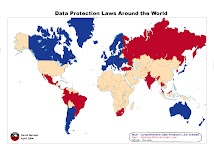Large financial institutions are quite stringent when it comes to screening their suppliers. Due diligence can be thorough and exhaustive. Small to medium financial firms often satisfy themselves with much less. An email, a credit or media check may be enough to satisfy them. The FSA in a consultation paper issued last year, stated that financial institutions should vet their suppliers and other third parties to ensure that they have sufficient controls to ensure data security. In addition, companies should take the time to check the publicly available sanctions list on the Treasury's website, to make sure that they are not providing financial services to rogue firms and money launderers.
Patrick Hosking and Michael Herman report in The Times:
_____________________________________________________________________
The Financial Services Authority (FSA) said last night that many small and medium-sized financial institutions have insufficient command and controls to prevent them doing business with those on the Government's blacklist of financial sanctions.The list, which is maintained by the Treasury, includes about 1,400 individuals and 500 entities in Britain and abroad. It includes individuals and businesses linked to al-Qaeda, the Taliban as well as North Korea and Iran and people linked more generally to terrorist financing.Providing banking or other financial services to members of the list can be a criminal offence and businesses are required to have sufficient controls in place to avoid this.After surveying 228 financial firms, the FSA concluded: “There is significant scope across the industry for improvement in firms' systems and controls.” Leading financial institutions were also said to be “falling short”. The report highlighted one specific area of ignorance among British firms: a widespread belief that the sanctions applied only to foreign entities and individuals. In fact, the FSA reminded financial businesses that the banned list contains 50 individuals and 12 entities based in the UK.It also said that there was widespread confusion about the sanctions regime, with many firms believing that it took affect only with financial transactions above a certain size and therefore exempted smaller businesses.Another failing was that many firms were screening new clients retrospectively, sometimes weeks after an initial account had been opened, instead of before clients were taken on.The Treasury is responsible for policing firms that break the sanctions, but the FSA's remit includes making sure that UK financial groups have sufficient systems in place to prevent them from accepting blacklisted clients.
Tuesday, 28 April 2009
Subscribe to:
Post Comments (Atom)




No comments:
Post a Comment